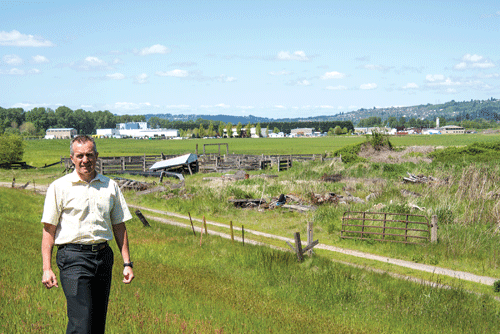“Economically viable energy is a fundamental driver of growth,” said Larrabee. “It’s not a dollar generator, but allows dollars to be generated. That’s not just a business message, ultimately that translates to a quality of life message.”
“Both companies want to be good corporate citizens, both from a business economic growth perspective and a community growth perspective,” said Larrabee.
Larrabee stressed that both Tesoro and Savage have good track records for being actively involved in the communities in which they do business, and encourage their employees to provide input on what form this community support takes. In North Dakota, where Savage built a similar facility, they helped with projects as diverse as paving the parking lot for a churchcommunity center to student scholarships for a Washington, D.C. trip to learn more about their country.
Neither the Columbia River Economic Development Council (CREDC) nor the Greater Vancouver Chamber of Commerce (GVCC) has taken an official position about the proposed oil terminal; both are awaiting more data. The upcoming economic impact study should help provide some of that info, and the two agencies are also conducting their own analyses.
Mike Bomar, CREDC executive director, said they are planning to do an economic development assessment of the project, focusing on how the project relates to the goals laid out in the Clark County Economic Development Plan. Bomar said that in April the CREDC would have some idea of the timeframe for completion of their assessment.
Kelly Love-Parker, chamber president, said that “given the gravity of the project and legitimate concerns about safety, it is likely we’ll take a position. But I don’t know what that position will be and don’t know how long it will take us to reach a level of comfort in weighing in on this important matter.”
The chamber, said Love-Parker, will not hurry their investigative process.
“We’ve been asked how we feel about the project,” she said, “but we don’t ‘feel’ – we ‘think.’ We will slow our deliberative process enough to separate feelings from fact, and ask pertinent questions.”
Love-Parker did point out that, if this project is stopped by opposition from Vancouver, BNSF will likely continue to route crude oil trains through town, headed north or south. Larrabee confirmed that, saying that “today and in the future, there have always been hazardous materials traveling through [Vancouver], and some are much more dangerous than crude oil. He also stated that there are several examples throughout this country where communities are revitalizing areas where rail is in place, and these areas have become the most vibrant parts of those towns.
“The intersection of industry and new development exist fine together,” said Larrabee.
{jathumbnail off}










